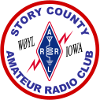What is Ham Radio?
Amateur Radio, also known as "ham radio", is about communication and experimentation. It is both a hobby and a service. "Hams," who are licensed by their governments, operate two-way communication equipment from their homes, cars, or other locations to communicate with other hams across town, in the next state, or around the world. Special sets of radio frequencies are set aside for use exclusively by amateur radio operators.
In the United States, hams are licensed by the Federal Communications Commission. Amateurs communicate with each other through a wide variety of modes, ranging from morse code and voice transmissions that span the world on short-wave frequencies, to VHF/UHF voice modes through repeater systems in local areas, and even with digital modes and through satellites!
An important role of ham radio is emergency communications. Hams are well known for their role in providing communications during emergency situations.
Who Can Become A Ham?
Just about anyone can become a licensed amateur operator. There are no age limits. Many people with disabilities find a door to the world with amateur radio. Some famous people are hams, but most are people from all walks of life who enjoy making friends around the world.
Anyone with an interest in radio, computers, satellites, electronics or communications will find many opportunities in ham radio. Many people use amateur radio to keep in touch with friends and family members.
Find out how Hams help with Emergency Service or how they say Hello World.
How Can I Become a Ham?
Getting an amateur radio license is easier than you might think. In the U.S., the entry license for VHF/UHF communications requires passing a written test on basic electronics theory and FCC rules and regulations. No morse code test is required. High frequency, or short-wave operations, requires passing an additional written test. While many hams enjoy using morse code, it is no longer required for the extra high frequency privileges. Several books and materials are available at local electronic stores or on the internet to help you study for your exam. Testing opportunities in central Iowa are listed on this web page. You can contact the person listed for any test for more information or you can just show up at the listed time and place and take the test.
Hamfests provide opportunities for amateur radio operators to get together for swap meets, seminars, and friendship. Most hamfests begin in the early morning and wrap up in early afternoon and sometimes sooner. Testing is often offered at hamfests, usually during the first few hours of the event. Check the Events section of our website for details.
More information on Amateur Radio can be found by visiting the American Radio Relay League web site at http://www.arrl.org or by writing to The American Radio Relay League, 225 Main Street, Newington, CT 06111-1494. Or, just come to one of our meetings – we'd be glad to help.
